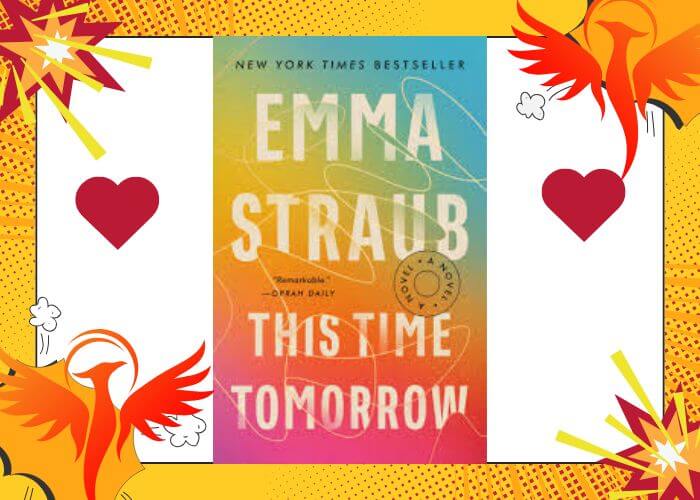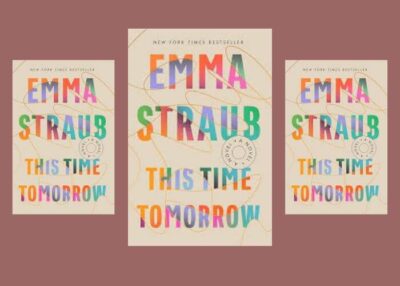Blog
This Time Tomorrow by Emma Straub – Book Review

Introduction
What if you could go back in time and relive pivotal moments with the people you love most? This compelling question forms the heart of Emma Straub’s latest offering, “This Time Tomorrow“, a new novel that masterfully blends contemporary fiction with magical realism elements. Emma Straub has established herself as a beloved storyteller, and this time-travel novel showcases her ability to tackle profound themes with both humor and heart.
Published as another entry in Emma Straub’s growing catalog of emotionally resonant fiction, “This Time Tomorrow” presents a different kind of love story—one between a daughter and her aging father. Straub offers her own twist on traditional time travel tropes, creating what can only be described as an addictive and lovely novel that will resonate with readers across generations.
Plot Summary (Spoiler-Free)

At the center of this heartbreaking book is Alice, a woman approaching her 40th birthday who finds herself at a crossroads. When Alice wakes up the next morning, she discovers something extraordinary has happened—she finds herself back in 1996, inhabiting her adolescent body on her sixteenth birthday. This kind of book defies easy categorization, as the story could be a comedy or a tragedy, depending on how one views the passing of time.
The central premise revolves around Alice’s opportunity to spend precious time with her dad, Leonard, whose health is declining in the present day. Armed with a new perspective from her adult experiences, Alice must navigate the complexities of being sixteen again while maintaining her adult consciousness. The story unfolds against the backdrop of Brooklyn, shifting seamlessly between present day and the layers of ’90s nostalgia.
The father-daughter relationship serves as the emotional core of the narrative, exploring how Alice grapples with the knowledge that her father is ailing while trying to make the most of this unexpected second chance. The time travel stories element never overshadows the human drama at the book’s heart.
Character Analysis
Alice Stern (Protagonist)
Alice emerges as a deeply relatable protagonist, a woman whose perspective on her own life undergoes dramatic transformation throughout the story. The contrast between teenage Alice and adult Alice creates fascinating internal dynamics as she navigates familiar situations with newfound wisdom. Her character is a time traveler, not just in the literal sense, but emotionally and psychologically as well.
Supporting Characters
Leonard Stern, Alice’s father, represents the heart of this different kind of love story. The version of her father that Alice encounters in the past allows for a poignant exploration of parent-child relationships when both parties are at different life stages. The supporting cast, including Alice’s teenage friends and romantic interests, provides authentic backdrops for her journey of self-discovery.
Themes and Deeper Meaning
“This Time Tomorrow” explores the universal desire to call the people you love and spend more meaningful time with them. The novel examines how we process regret, acceptance, and the inevitable “what if” questions that plague us all. Straub masterfully weaves together themes of aging parents, middle-age reflection, and the bittersweet nature of family dynamics.
The idea of time travel serves as more than just a plot device—it becomes a metaphor for the ways we revisit our past selves and relationships. The book explores how, armed with a new perspective, we might handle past situations differently, while also acknowledging that some things are beyond our control.
Writing Style and Narrative Structure
Emma Straub’s prose style demonstrates why she has become such a beloved New York Times bestseller. The writing balances accessibility with emotional depth, making this book one that will make readers both laugh and cry. Straub handles the time travel mechanics with a light touch, focusing more on emotional authenticity than scientific explanations.
The pacing allows readers to fully absorb both the fun of time travel and the deeper emotional currents running through the story. Straub’s dialogue feels natural and unforced, whether depicting teenage conversations or adult reflections on life’s complexities.
Strengths of the Book
This time-travel book succeeds primarily because of its emotional authenticity. Straub has created a narrative that feels both fantastical and deeply grounded in human experience. The father-daughter relationship is portrayed with such genuine affection and complexity that readers will find themselves reflecting on their own family dynamics.
The adolescent body that shocks Alice provides both humor and pathos, as she grapples with the physical reality of being sixteen again. The book’s handling of difficult topics—illness, mortality, and regret—never feels heavy-handed or manipulative.
Straub demonstrates remarkable skill in balancing nostalgic elements without becoming overly sentimental. The layers of ’90s nostalgia feel authentic rather than forced, creating a vivid sense of time and place that enhances rather than distracts from the story.
Areas for Improvement
While this new novel largely succeeds in its ambitious premise, some readers might find certain aspects of the time travel logic convenient rather than fully developed. The focus on emotional storytelling sometimes comes at the expense of exploring the more complex implications of time travel.
Some plot elements follow predictable patterns, though Straub’s skilled character development helps mitigate these concerns. The balance between humor and heartbreak is generally well-maintained, though occasional tonal shifts might feel jarring to some readers.
Target Audience and Comparisons
This book will particularly appeal to readers who enjoy literary fiction with magical realism elements, family sagas, and stories about second chances. Fans of Emma Straub’s previous work will find familiar themes and emotional depth, while newcomers will discover why she has become such a beloved author.
Readers who enjoyed other time travel books but prefer character-driven narratives over science fiction elements will find this novel particularly satisfying. The book shares DNA with other contemporary fiction that explores parent-child relationships and middle-age reflection.
Critical Reception Context
“This Time Tomorrow” has received widespread critical acclaim, with many reviewers praising Straub’s ability to handle fantastical elements with emotional realism. The book has earned recognition for its authentic portrayal of family dynamics and its fresh take on time travel storytelling.
Readers have responded positively to the book’s accessibility and emotional honesty, making it a popular choice for book club discussions and personal reading alike.
Personal Reading Experience
I enjoyed this book experience, which stems from Straub’s ability to make fantastical elements feel emotionally true. The moments between Alice and her father resonate with anyone who has watched a parent age or wished for more time with loved ones.
The book succeeds in making readers consider their own relationships and choices without being preachy or heavy-handed. Straub’s gentle humor and genuine affection for her characters create an engaging reading experience that lingers long after the final page.
Conclusion
“This Time Tomorrow” represents Emma Straub at her most emotionally ambitious and successful. This heartbreaking book manages to be both a satisfying time travel novel and a profound meditation on family, love, and the passing of time. Straub has created a book that will make readers both laugh and cry, while providing a fresh twist on traditional time travel narratives.
The novel deserves recognition as both entertaining fiction and a meaningful exploration of universal themes. Readers seeking a book that combines accessibility with emotional depth will find “This Time Tomorrow” to be a rewarding experience that encourages reflection on the people and moments that matter most.
For anyone who has ever wondered what they might do differently given a second chance, “This Time Tomorrow” offers both escapist entertainment and genuine insight into the complexities of human relationships. Straub has crafted a book that reminds us to cherish the time we have with the people we love—a message that resonates long after the story ends.
